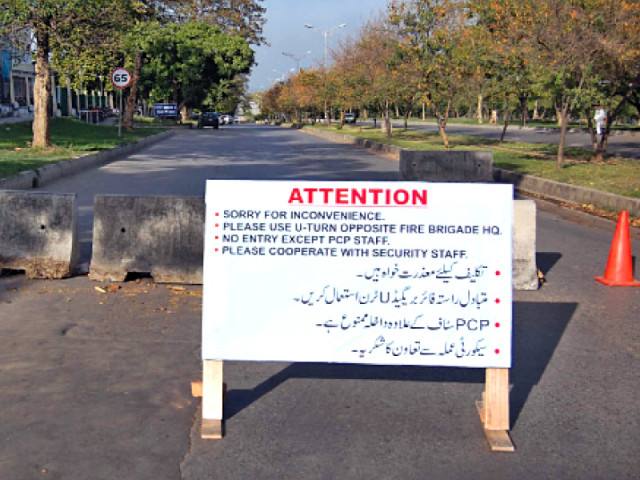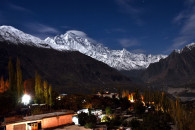Denial of basic right In the name of ‘security’, another road closed
Area around PCP office closed, CDA office almost inaccessible.

All roads to Printing Corporation of Pakistan (PCP) are blocked for everyone, except PCP employees. PHOTO: MUHAMMAD JAVAID/EXPRESS
Denial of freedom of movement through closure of major roads in the name of securing ‘sensitive buildings’ is a serious violation of fundamental human right and nothing new for the residents of the federal capital.
Violation of this very basic right by law enforcers and sensitive agencies, have always been sold to the public under the pretext of ‘security measures’, thus placing them beyond critique.
The same plea is being offered to justify closing of the roads around the Printing Corporation of Pakistan building in Sector G-7/4 recently.
A patch of Khayyaban-i-Suhrawardy which runs along the headquarters of Inter Services Intelligence, the country’s premier spy agency, has now been closed for the general public up to the PCP building, adding to the problems of the residents living in the locality as well as to those who visit the area for various official works.
All this comes despite the fact that soldiers have already been deployed at the PCP building to provide security during the printing of ballot papers for upcoming general elections, and only PCP officials are allowed to enter the premises of building.
Meanwhile, in the same sub-sector, Street 37, which leads to Capital Development Authority (CDA) Headquarters, has been closed because it runs along the back of the PCP building.
Now, the only way to reach the CDA office is through Street 38. “On an average over 1,500 people come to the office a day. After the closure of these roads, pedestrians will have to walk at least half-a-kilometre to get here,” said a CDA official.
“I reached the CDA office using public transport. After getting out of the van on the main road, security men told me to take the alternate route to the office, and when I reached street 37, I was told to take another detour through street 38. It took over 30 minutes for what is essentially a walk across a road,” said Naseem Ahmed, who went to get some land transferred in his name.
Even legislators from the last National Assembly focused on opening closed roads and streets in front of five star hotels and foreign missions operating in residential areas, but their efforts were an abject failure, and the barricades remained untouched, except for a handful of cases where they were actually expanded.
When asked about the road closure, even the Election Commission of Pakistan’s (ECP) media head gave examples it’s not the first time as already roads in spoke of how the citizens of Islamabad are used to blockades in front of big hotels and the Federal Investigation Agency (FIA) and ISI buildings for security purpose.
ECP Media Director Khurshid Alam told The Express Tribune that the commission was aware of the difficulties citizens had been facing due to the ‘security measures’ around the PCP building, saying the “roads are closed temporarily, not permanently”. He maintained that the printing of ballot papers will start on April 19 and conclude on April 24, after which roads would be opened.
In the recent past, the Islamabad High Court and parliamentary panels have taken up the staggering number of road blockades including police checkpoints, across the city.
According to a report prepared by the capital police, there are 115 barriers in the capital.
The same report suggests that main roads of the city have been completely blocked at 10 different points.
Published in The Express Tribune, April 16th, 2013.



















COMMENTS
Comments are moderated and generally will be posted if they are on-topic and not abusive.
For more information, please see our Comments FAQ